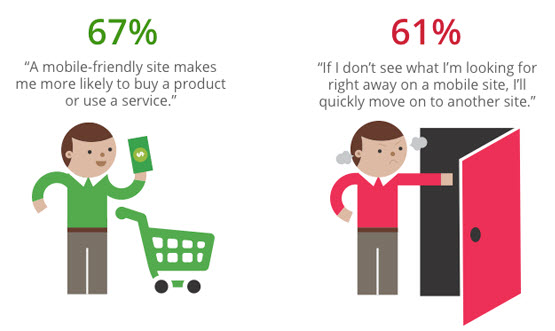Mobile SEO Is Not A Myth: 8 Popular Claims Refuted
Last year at this time, I refuted 7 myths in mobile SEO, saying mobile SEO isn’t a myth, but there are myths in mobile SEO. As we near the end of 2012, there are still too many SEOs who put mobile SEO in the same category as Santa Claus and his elves: good story but […]
Last year at this time, I refuted 7 myths in mobile SEO, saying mobile SEO isn’t a myth, but there are myths in mobile SEO. As we near the end of 2012, there are still too many SEOs who put mobile SEO in the same category as Santa Claus and his elves: good story but entirely mythical (sorry, kids!).
I’m seeing mobile search and mobile SEO on too many “let’s stop talking about this next year” lists, and I think that’s a shame. To illustrate why, here are eight of the most popular reasons given for mobile SEO’s nonexistence, refuted:
1. Mobile Search Behavior The Same As Desktop/Tablet/Laptop
The claim: When we analyze mobile search queries, it appears that mobile searchers are mostly looking for the same types of things that desktop/tablet/laptop searchers are looking for. There doesn’t appear to be a need to do additional keyword research since search behavior doesn’t vary by platform.
The reality: If you look at what visits you’re getting from mobile searchers in Web analytics, you’re looking at terms that you’ve already optimized for. If there are terms that mobile searchers use that desktop searchers don’t (or don’t as frequently), you really need to do mobile keyword research in order to uncover them.
If you’ve done mobile keyword research by using the Google AdWords Keyword Tool and comparing mobile percentage of total or the mobile ratio and you still don’t see a difference between mobile and desktop search behavior, it could be that your site and/or vertical is one in which there is not a lot of variance between what mobile searchers and desktop searchers are looking for.
It does not follow that there is no variance to be found. In fact, as we demonstrated earlier this year, for certain categories like Dining and Nightlife, Retail and Sports & Fitness, there’s a high degree of variance between how people search on desktops vs. smartphones.
Finding that value-add in mobile that isn’t a priority on desktop could not only better serve your user, but it could also differentiate you from your competitors who are putting efficiency ahead of optimization.

Research shows that mobile searchers and desktop searchers are often not searching for the same things.
2. Mobile Search Results The Same As Desktop/Tablet/Laptop
The claim: When I look at the search results on my mobile device and compare them to results on my laptop, they appear to be the same.
The reality: Some results are the same or similar, and some results are not. Google, whom Statcounter reports as having 91% of the market share in the United States, and 96% worldwide, develops for mobile search, tablet search and desktop search separately.
While the goal ultimately is ubiquity between the user interfaces when it makes sense, the reality is that there are many differences between the interfaces, some of them significant.

Many differences between desktop and mobile search results, including blended app results on mobile but not desktop
In August of this year I discussed 16 differences between mobile search and desktop search (up from 14 in 2011), which may account for the study I did two years ago in which smartphone and desktop rankings in Google varied by 86%.
If you’ve read these articles and you still believe that mobile search and desktop search are the same, you’re either not paying attention or you’re ignoring the differences to your eventual detriment.
3. Mobile Searchers Don’t Use Mobile Search Results
The claim: Because of Google Goggles, Google Now, Siri and other mobile search interfaces, and eventually wearable computing, the search results on mobile devices won’t be seen.
The reality: While this might describe a future state; at the moment, all of these technologies have so little market share that they have had minimal impact on mobile search or SEO. As I explained at SMX East this year, for all the attention it gets, Siri has a limited audience, with just 2.5% of the total search market share at most. It’s likely the other technologies have even less market share.
Even if the market share increases, however, it’s unlikely that autonomous search will ever replace traditional search results, as even Google Now and Google Goggles incorporate standard Web results into their interfaces.
And finally, the presence of new user interfaces like mobile visual search through Google Now doesn’t negate mobile SEO, but instead differentiates it even more from the traditional version.
4. Buzzword That No One Understands
The claim: Mobile SEO is for salesmen looking to upsell, rather than an actual discipline.
The reality: This one is actually pretty offensive to people like me who specialize in mobile SEO and have been doing so for about eight years, as it claims that I’m either a charlatan or enjoy wasting my time. I sympathize with the sentiment, actually, as Googling [mobile SEO] does bring up a lot of results from sites that don’t always agree on what mobile SEO is and why it’s needed. But then, Googling [seo] will often give you similar results.
Like any discipline that is dynamic, relatively nascent and not regulated by official bodies, there is a lot of garbage out there since any idiot can claim to know something about the subject; and, if he or she is loud enough, others with the same ignorant opinion will take notice.
This confusion doesn’t mean that no one understands the subject, though, any more than claiming no one understands law or medicine, since there are a lot of different opinions about free speech and euthanasia.
That being said, there are a lot of charlatans adding mobile SEO services these days who just want to take your money. As with any SEO, do your homework and you can avoid the disreputable options.
5. Mobile SEO Is Actually Local SEO
The claim: When people talk about mobile SEO, they really mean to say local SEO, as they’re describing techniques used to optimize for a local audience.
The reality: Some people say mobile SEO when they mean local SEO, but that doesn’t mean that all mobile SEO is local SEO. Local intent is more pronounced in mobile searches than it is in desktop searches because many mobile searchers have local intent; but not all of them do.
Apps, games, mobile wallpaper and other types of branded content are all opportunities for optimized content that aren’t local in nature, and are specific to users of mobile devices.
Furthermore, there are site architecture and marketing considerations for optimizing mobile sites and apps that have nothing to do with local search.
6. Mobile SEO Is Just SEO For Mobile Searchers
The claim: There’s no difference between mobile SEO and traditional SEO, as mobile SEO is just SEO best practices applied to a mobile search paradigm.
The reality: Yes, mobile SEO is SEO applied to the mobile paradigm, but there are still plenty of differences between mobile SEO and traditional SEO, as I discussed last year. Early this year, I also gave 7 examples of duplicate content created only by mobile sites that someone versed only in traditional SEO probably wouldn’t find.
Clearly, mobile SEO isn’t an entirely different discipline from SEO, but it does require specialized knowledge that someone ignoring the term willfully isn’t likely to receive.
7. Building A Site That Works Well On Multiple Devices Preferable To Optimizing Mobile Site
The claim: Smartphone users can access well-designed desktop websites, so there’s really no need for additional effort to understand mobile searchers and search engines.
The reality: Yes, Apple does not have a mobile website, but that doesn’t mean they wouldn’t be better optimized if they had one.
According to Google data from this year, 61% of prospects say that if they don’t find what they’re looking for right away on a mobile site, they’ll quickly go to another site. And abandonment rates from mobile search are five times higher than desktop. You may think pinching and zooming is no big deal, but does your target audience?

Image from Google 2012 study demonstrating mobile searcher preferences
Many businesses find that their conversion rates from search increased as a result of having a mobile site, not just a desktop site that works reasonably well on mobile devices — including TicketsNow, 1-800-Flowers, Jelly Belly, eBay, Amazon, BMW and many others.
You may think your site works fine on mobile devices, but that doesn’t mean it’s optimized.
8. No Additional Linking Opportunities In Mobile SEO
The claim: Given that Google’s recommendation is responsive Web design, there’s no additional URL to build links to, and thus no additional opportunities for link building.
The reality: If you make your site mobile, you have the potential to get incremental authoritative links that you wouldn’t have otherwise received.
This applies, of course, if you have a mobile site, as you’ll be eligible to get followed links from authoritative sites like Google, dotMobi, Mashable, Mobile Awesomeness, PC World, Webby Awards, JQMGallery, and any place that talks about great mobile site design.
It also applies if you have a responsive website. You won’t have a separate URL, but you will have additional links from places that showcase responsive sites, like mediaqueri.es, .Net magazine, Smashing magazine et al.
So there you have it. Mobile SEO is many things, but definitely not a myth. Knowing this, will 2013 finally be the year that you account for it in your marketing plan? Ignoring it or pretending it doesn’t exist isn’t making it go away, and it’s certainly not making you any money.
Fortunately, not every SEO guru thinks mobile SEO is a myth. As the Art of SEO co-author, SEO veteran, Search Engine Land writer and Netconcepts founder Stephan Spencer recently said on Twitter…
TL; DR Recap:
Mobile SEO is not a myth because:
- Mobile search results are different
- Mobile search behavior is often different
- Mobile search results are still relevant
- There are experts in the discipline, though many non-experts still give their opinions
- Mobile SEO often involves local SEO, but there are techniques that make it distinct from local SEO
- Mobile SEO is SEO, but there are nuances related to designing for mobile searchers that traditional SEOs are often unaware of.
- Mobile sites convert more mobile searchers (i.e. are more optimized) than sites that work well on all devices
- Regardless of mobile configuration method, making site mobile can get you incremental authoritative links to help in ranking.
Contributing authors are invited to create content for Search Engine Land and are chosen for their expertise and contribution to the search community. Our contributors work under the oversight of the editorial staff and contributions are checked for quality and relevance to our readers. The opinions they express are their own.
Related stories
New on Search Engine Land
